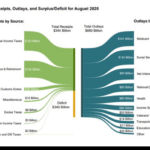The Trump family’s cryptocurrency venture, World Liberty Financial, officially launched its digital tokens on Monday, creating a surge of interest and a paper value increase of approximately $5 billion for the family. These tokens, known by the ticker $WLFI, encountered volatility right from their debut, with prices dropping from an initial trading value of over $0.30 to around $0.20 by the end of the day.
The introduction of these tokens follows a year of development after the Trump family and its associates unveiled a decentralized finance platform that has also issued a stablecoin. This stablecoin is designed to maintain its value by being pegged to a specific asset. Investors had previously voted in July to allow the tokens to be traded, a move aimed at potentially enhancing their value as market forces come into play.
In terms of trading, the opening hour saw close to $1 billion worth of $WLFI tokens change hands. This trading activity positioned the token to have a market capitalization of just under $7 billion, making it the 31st largest cryptocurrency in circulation, according to trading analysis firm CoinGecko. Notably, several major cryptocurrency exchanges, including Binance, OKX, and Bybit, have begun offering the $WLFI tokens on their platforms.
Since World Liberty’s inception, estimates suggest that the Trump family has earned around $500 million from this venture, based on calculations by Reuters which took into account transaction data and the company’s operational framework. The Trump family’s stake in the project, which accounts for about a quarter of the total tokens, has been a significant contributor to their financial gain.
Donald Trump himself holds an unspecified amount of the $WLFI tokens but is prohibited from selling them, along with other team members, including his sons. His involvement as a “co-founder emeritus” has generated interest in the tokens, particularly from those looking to capitalize on the connection to his name. This move towards making the tokens tradable opens the door for speculative trading and could attract a broader range of investors.
However, the Trump family’s foray into the cryptocurrency sector has not escaped scrutiny. Critics, including Democratic lawmakers and government ethics experts, argue that the simultaneous overlap of Trump’s regulatory adjustments regarding digital currencies and the family’s crypto ventures presents glaring conflicts of interest. Nevertheless, the White House maintains that Trump’s assets are managed in a trust executed by his children, asserting there are no conflicts of interest involved.
As the cryptocurrency landscape continues to evolve, the implications of such ventures by prominent political figures invite discussion around ethical governance and the burgeoning world of digital finance.







